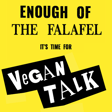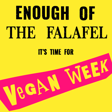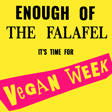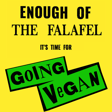
163- Plant-milk for the kids: (some) Democrats & Republicans agree...
A new US bill has been proposed & supported by both Democrats & Republicans that would make plant-based milk more accessible in schools. But are Carlos, Kate & Ant optimistic...or will this get rebuffed by raw milk fan RFK Jnr? This- plus eight bits of vegan & animal rights news from the last week- is on the menu in this episode.
****************
Enough of the Falafel is a community of people who love keeping on top of the latest news in the world of veganism & animal rights. With the Vegan Week podcast, we aim to keep listeners (& ourselves) informed & up-to-date with the latest developments that affect vegans & non-human animals; giving insight, whilst staying balanced; remaining true to our vegan ethics, whilst constantly seeking to grow & develop.
Each week we look through news stories from the past 7 days in the world of veganism & animal rights.
If you spot any news stories that might catch our fancy, or have an idea for a discussion topic, get in touch via enoughofthefalafel@gmail.com.
******************
This week's stories:
https://www.bbc.co.uk/news/articles/cvgp6gyvk3no
https://www.france24.com/en/live-news/20250403-sri-lanka-s-crackdown-on-dogs-for-india-pm-s-visit-sparks-protest
https://www.huntsabs.org.uk/mink-hunting-season-is-underway/
https://vegconomist.com/market-and-trends/plant-based-dairy-sales-western-europe-north-america-rapid-growth/
https://www.greenqueen.com.hk/brazil-vegano-survey-meat-beef-health-plant-based/
https://www.theanimalreader.com/2025/04/04/slovakia-to-kill-350-bears-after-fatal-attack-on-man/
https://www.theguardian.com/sport/2025/apr/05/animal-rights-groups-hit-out-at-grand-national-after-broadway-boys-horrific-fall
https://www.bbc.co.uk/news/articles/cwy710rv54wo
https://www.greenqueen.com.hk/national-school-lunch-program-whole-milk-plant-based-dairy-act/
****************
Thanks everyone for listening; give us a rating and drop us a message to say "hi"; it'll make our day!
Carlos, Kate & Ant




